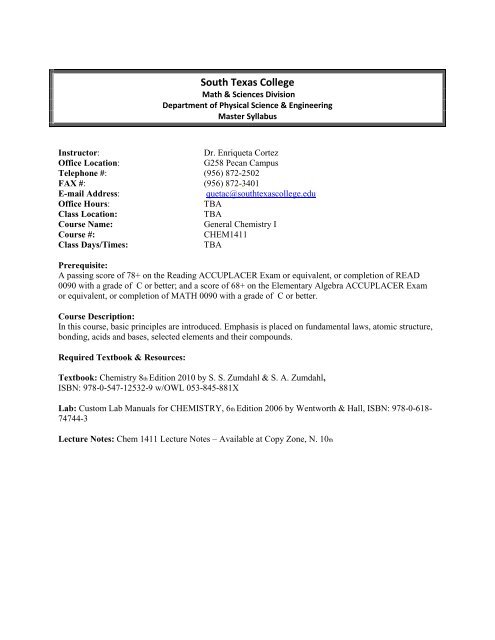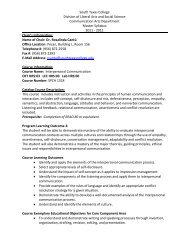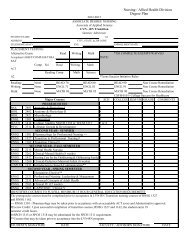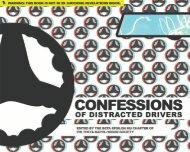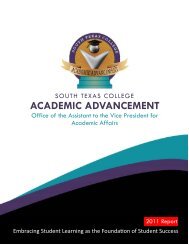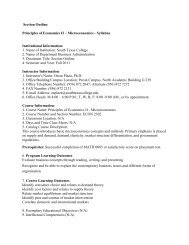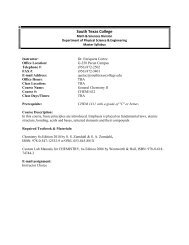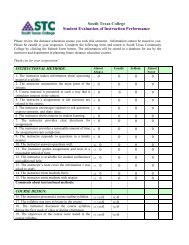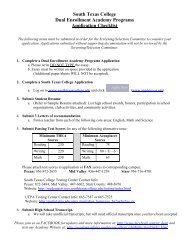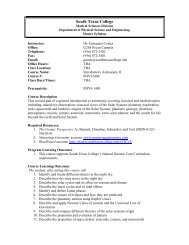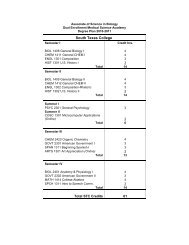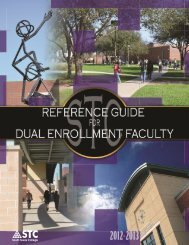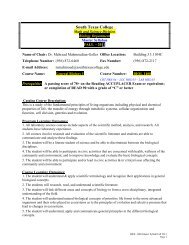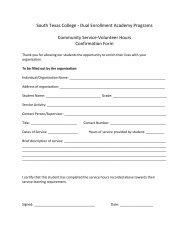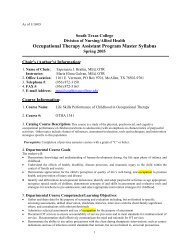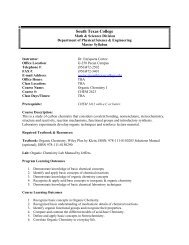CHEM 1411 - General Chemistry I - South Texas College
CHEM 1411 - General Chemistry I - South Texas College
CHEM 1411 - General Chemistry I - South Texas College
Create successful ePaper yourself
Turn your PDF publications into a flip-book with our unique Google optimized e-Paper software.
<strong>South</strong> <strong>Texas</strong> <strong>College</strong><br />
Math & Sciences Division<br />
Department of Physical Science & Engineering<br />
Master Syllabus<br />
Instructor:<br />
Dr. Enriqueta Cortez<br />
Office Location:<br />
G258 Pecan Campus<br />
Telephone #: (956) 872-2502<br />
FAX #: (956) 872-3401<br />
E-mail Address:<br />
quetac@southtexascollege.edu<br />
Office Hours:<br />
TBA<br />
Class Location:<br />
TBA<br />
Course Name:<br />
<strong>General</strong> <strong>Chemistry</strong> I<br />
Course #:<br />
<strong>CHEM</strong><strong>1411</strong><br />
Class Days/Times:<br />
TBA<br />
Prerequisite:<br />
A passing score of 78+ on the Reading ACCUPLACER Exam or equivalent, or completion of READ<br />
0090 with a grade of C or better; and a score of 68+ on the Elementary Algebra ACCUPLACER Exam<br />
or equivalent, or completion of MATH 0090 with a grade of C or better.<br />
Course Description:<br />
In this course, basic principles are introduced. Emphasis is placed on fundamental laws, atomic structure,<br />
bonding, acids and bases, selected elements and their compounds.<br />
Required Textbook & Resources:<br />
Textbook: <strong>Chemistry</strong> 8th Edition 2010 by S. S. Zumdahl & S. A. Zumdahl,<br />
ISBN: 978-0-547-12532-9 w/OWL 053-845-881X<br />
Lab: Custom Lab Manuals for <strong>CHEM</strong>ISTRY, 6th Edition 2006 by Wentworth & Hall, ISBN: 978-0-618-<br />
74744-3<br />
Lecture Notes: Chem <strong>1411</strong> Lecture Notes – Available at Copy Zone, N. 10th
Program Learning Outcomes<br />
1. Demonstrate knowledge of basic chemical concepts.<br />
2. Identify and apply basic concepts of chemical reactions.<br />
3. Demonstrate knowledge of organic chemistry concepts<br />
4. Recognize and apply aced/base concepts to inorganic and organic chemistry.<br />
5. Demonstrate knowledge of basic chemical laboratory techniques.<br />
Course Learning Outcomes<br />
1. Define and classify the fundamental properties of matter and compounds.<br />
2. Identify chemical property trends in the periodic table and determine the basic nuclear<br />
and electronic structure and bonding of atoms. Identify and calculate concentration<br />
expressions for homogenous solutions.<br />
3. Write chemical formulas and use the rules of nomenclature to name chemical compounds and<br />
solve stoichiometry problems.<br />
4. Write and balance equations and define the types and characteristics of chemical reactions.<br />
5. Use gas laws and basic Kinetic Molecular Theory to solve gas problems.<br />
6. Use basic apparatus and apply experimental methodologies used in the chemistry laboratory<br />
using safe and proper handling of laboratory equipment and chemicals.<br />
7. Make and record experimental observations and measurements, comparing them with<br />
theoretical principles, and clearly communicate experimental results in written reports.<br />
8. Interpret laboratory results and experimental data, and reach logical conclusions.<br />
9. Identify appropriate sources of information for conducting laboratory experiments involving<br />
principles of chemistry.<br />
Core Curriculum Exemplary Educational Objectives<br />
1. To understand and apply method and appropriate technology to the study of natural sciences.<br />
2. To recognize scientific and quantitative methods and the differences between these approaches<br />
and other methods of inquiry and to communicate findings, analyses, and interpretation both<br />
orally and in writing.<br />
3. To identify and recognize the differences among competing scientific theories.<br />
4. To demonstrate knowledge of the major issues and problems facing modern science, including<br />
issues that touch upon ethics, values, and public policies.<br />
5. To demonstrate knowledge of the interdependence of science and technology and their influence<br />
on, and contribution to, modern culture.<br />
Intellectual Competencies<br />
1. Students will read, analyze and interpret textbook, handouts, chemistry experiment manuals,<br />
and/or visual aids used during the semester.<br />
2. Students will develop, organize, draft, revise, and write reports for experiments conducted<br />
during the semester and/or research topic related to chemistry.<br />
3. Students will use computer-based technology in solving problems, conducting computer based<br />
chemistry labs and will use internet to access websites that will assist in their study of chemistry.<br />
4. Students will demonstrate effective oral communication techniques using clear concise and<br />
informative language when speaking.
5. Students will analyze and interpret various forms of spoken communication like lecture by the<br />
instructor, discussion with the lab partners, or audio video demonstrations during the lectures.<br />
6. Students will demonstrate problem-solving skills in a logical step-by-step process when doing<br />
chemistry labs. They will apply methods of qualitative and quantitative analysis during their<br />
understanding and following the lab procedures.<br />
Departmental Course Perspective<br />
1. Students will recognize the importance of maintaining health and wellness by following the<br />
safety procedures, maintaining cleanliness, and avoiding contact with materials hazardous for<br />
health, while doing the chemistry labs<br />
2. Students will develop a capacity to use knowledge of how technology and science affect their<br />
lives by utilizing everyday practical examples and applications of chemistry and by performing<br />
chemistry experiments.<br />
3. Students will develop personal values for ethical behavior by understanding the rules and<br />
regulations in relation to safety, cited works, and disposal of waste materials after performing<br />
chemistry labs.<br />
4. Students will use logical reasoning in problem solving by identifying and analyzing chemistry<br />
word problems and selecting a logical solution<br />
5. Students will integrate knowledge and understand the interrelationships of scholarly<br />
disciplines by using technical writing, applying the rules of mathematics, tracing the history of<br />
philosophy describing different aspects of sciences, and finding chemistry’ applications in<br />
biology and technology while studying chemistry.<br />
Instructor Outcomes<br />
Department Course Grading Criteria:<br />
Lecture: 75%<br />
Instructor Choice<br />
Lab: 25%<br />
Instructor Choice<br />
Grading Time Line<br />
Instructor Choice<br />
Class Policies:<br />
Instructor Choice<br />
Lab Policies:<br />
Instructor Choice<br />
Attendance Policies:<br />
Instructor Choice
Chem<strong>1411</strong> - <strong>General</strong> <strong>Chemistry</strong> I (Fall – 2011)<br />
L = Lecture E = Experiment P = Student Presentations<br />
<strong>General</strong> Description of Lectures<br />
Assignments &<br />
Date By Chapter Activities Examinations<br />
8/29/11 to<br />
9/2/11<br />
9/05/11 to<br />
9/09/11<br />
9/12/11 to<br />
9/16/11<br />
9/19/11 to<br />
9/23/11<br />
9/26/11 to<br />
9/30/11<br />
10/03/11 to<br />
10/07/11<br />
10/10/11 to<br />
10/14/11<br />
10/17/11 to<br />
10/21/11<br />
10/24/11 to<br />
10/28/11<br />
10/31/11 to<br />
11/04/11<br />
11/07/11 to<br />
11/11/11<br />
11/14/11 to<br />
11/18/11<br />
11/21/11 to<br />
11/25/11<br />
11/28/11 to<br />
12/02/11<br />
12/05/1 to<br />
12/09/11<br />
12/12/11 to<br />
12/16/11<br />
Ch. 1 & 2: Classification of Matter, Dalton's Atomic Theory,<br />
Early Experiments to Characterize the atom, modern Atomic<br />
Theory, An Introduction to the Periodic Table, Isotopes L&LabSafety Quiz #1<br />
Ch. 2 & 7: Molecules and Ions, Writing Names and Formulas<br />
of compounds L/P/E Quiz #2 & Quiz #3<br />
Ch. 7: Quantum Mechanical Model of the atom, Quantum<br />
Numbers, Orbital shapes, Electron spin, Pauli's Principle L/P/E Quiz #4 & Quiz #5<br />
Ch. 7: History of the Periodic Table, The Aufbau Principle,<br />
Electronic configurations, Periodic Trends L/P/E Quiz #6 & Test #1<br />
Ch. 1: Units of Measurement, Significant Figures and<br />
Calculations, Scientific Notation, Rounding off,<br />
Dimensional Analysis, Using the Calculator L/P/E Quiz #7<br />
Ch. 1 & 3: Density, Temperature, The Mole Concept,<br />
Molar Mass, Percentage Composition, Empirical &<br />
Molecular Formulas L/P/E Quiz #8 & Quiz #9<br />
Ch.3: Chemical Reactions, Balancing Chemical Equations,<br />
Mass – Mass Calculations L/P/E Quiz #10<br />
Ch. 3: Mass – Mass Calculations, Identifying Limiting<br />
Reactant, Percent Yield Calculations L/P/E Quiz #11 & Test #2<br />
Ch. 4: Properties of Aqueous Solutions, Composition of<br />
Solutions L/P/E Quiz #12<br />
Ch. 4: Types of Chemical Reactions, Stoichiometry of<br />
Reactions in Solution L/P/E Quiz #13<br />
Ch.4 & 5: Redox Reaction, Pressure, The Gas Laws of Boyle,<br />
Charles, Avogadro, & Gay-Lussac L/P/E Quiz #14<br />
Chapter 5: The Ideal Gas Law, Gas Stoichiometry, Dalton’s<br />
Law of Partial Pressures, The Kinetic Molecular Theory L/P/E Quiz #15 & Test #3<br />
Ch. 6: Thermochemistry, Energy, Work, 1st Law of<br />
Thermodynamics L/P/E Quiz #16<br />
Ch. 6 & 8: Heats of formation, Law of Hess, Types of Chemical<br />
Bonds, Lewis Dot Structures L/P/E Quiz #17<br />
Ch. 8 & 9: Hybridization, Valence Shell Electron Pair<br />
Repulsion, Molecular Orbital Models L/P/E Quiz #18 & Test #4<br />
Chapters 1 – 9<br />
Final Exam
SCAN SKILLS<br />
Reading: Reading at the college level means the ability to analyze and interpret a variety of printed<br />
materials—books, articles, and documents. A core curriculum should offer students the opportunity to<br />
master both general methods of analyzing printed materials and specific methods for analyzing the subject<br />
matter of individual disciplines.<br />
Writing: Competency in writing is the ability to produce clear, correct, and coherent prose adapted to<br />
purpose, occasion, and audience. Although correct grammar, spelling, and punctuation are each a sine qua<br />
non in any composition, they do not automatically ensure that the composition itself makes sense or that<br />
the writer has much of anything to say. Students need to be familiar with the writing process including<br />
how to discover a topic and how to develop and organize it, how to phrase it effectively for their<br />
audience. These abilities can be acquired only through practice and reflection<br />
Computer Literacy: Computer literacy at the college level means the ability to use computer-based<br />
technology in communicating, solving problems, and acquiring information. Core-educated students<br />
should have an understanding of the limits, problems, and possibilities associated with the use of<br />
technology, and should have the tools necessary to evaluate and learn new technologies as they become<br />
available.<br />
Speaking: Competence in speaking is the ability to communicate orally in clear, coherent, and persuasive<br />
language appropriate to purpose, occasion, and audience. Developing this competency includes acquiring<br />
poise and developing control of the language through experience in making presentations to small groups,<br />
to large groups, and through the media.<br />
Listening: Listening at the college level means the ability to analyze and interpret various forms of<br />
spoken communication.<br />
Critical Thinking: Critical thinking embraces methods for applying both qualitative and quantitative<br />
skills analytically and creatively to subject matter in order to evaluate arguments and to construct<br />
alternatives strategies. Problem solving is one of the applications of critical thinking, used to address an<br />
identified task.<br />
Developmental Studies Policy Statement:<br />
The <strong>College</strong>’s Developmental Education Plan requires students who have not met the college-level<br />
placement standard on an approved assessment instrument in reading, writing, and/or mathematics to<br />
enroll in Developmental Studies courses including <strong>College</strong> Success. Failure to attend these required<br />
classes may result in the student's withdrawal from ALL college courses.<br />
Statement of Equal Opportunity: No person shall be excluded from participation in, denied the benefits<br />
of, or be subject to discrimination under any program or activity sponsored or conducted by <strong>South</strong> <strong>Texas</strong><br />
<strong>College</strong> on the basis of race, color, national origin, religion, sex, age, veteran status or disability.<br />
Alternative Format Statement: This document is available in an alternative format upon request by<br />
calling ( 956 ) 618-8302.
ADA Statement: Individuals with disabilities requiring assistance or access to receive services should<br />
contact disABILITY Support Services at ( 956 ) 872-2173.<br />
ADDENDUM<br />
Following are examples of suggested instructional strategies for teaching some of the intellectual<br />
competencies and perspectives:<br />
Listening<br />
During the class session ask each student to formulate the answer to a question and then turn to a<br />
partner and share his or her answer with the partner. Through discussion the pair then formulates a<br />
new answer to the question. Then the instructor randomly calls upon pairs for their answer and<br />
provides immediate feedback.<br />
Writing, Computer Literacy, Speaking, and Interdisciplinary<br />
Students conduct on-line research on a topic related to the course, write a paper, and make an oral<br />
presentation to the class using Power Point. The writing and speaking skills will be evaluated based<br />
on acceptable communication skills for professionals in the field.<br />
Critical Thinking, Writing, Speaking, Computer Literacy<br />
Assign small groups a realistic case study from your field. Ask them to analyze the problem and<br />
develop a proposed solution. They could then write a paper and/or present their solution to the class.<br />
Health and Wellness and Interdisciplinary<br />
Students calculate the calorie content of various foods and, based on those findings, discuss which<br />
would be healthy food choices.<br />
Interdisciplinary<br />
Discuss how the artistic community approached social problems through the artists’ work.<br />
Ethical Behavior<br />
Discuss the ethics of downloading music from the Internet.


